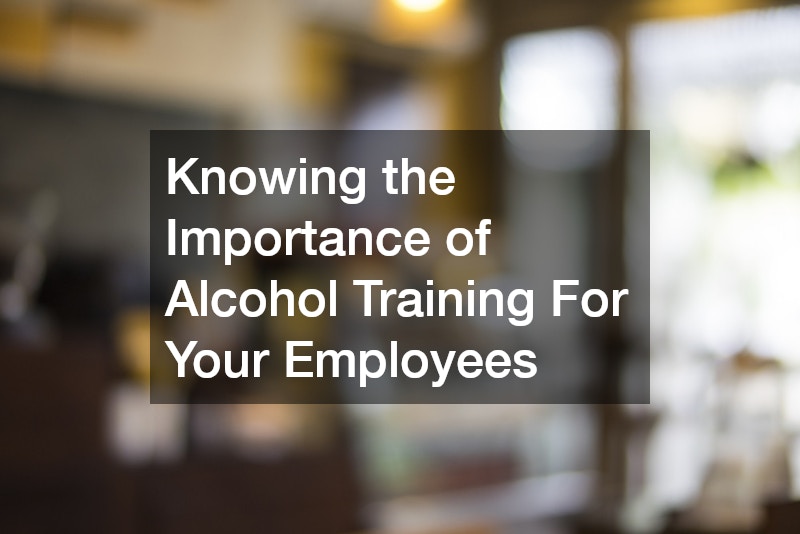

In today’s fast-paced working environment, equipping employees with the right skills is more vital than ever. One often overlooked area of training is alcohol training, crucial for many businesses in the hospitality and beverage industry. Educating your employees about responsible alcohol service can make a significant difference in your company’s reputation and success.
Alcohol training ensures that employees are well-informed about the laws and regulations surrounding alcohol consumption and service. This training helps in minimizing the risk of liability cases due to improper alcohol service.
Employee education in this area can also prevent potential legal issues that arise from serving alcohol, thus safeguarding the business.
Furthermore, having a staff well-versed in responsible alcohol service enhances customer satisfaction. When employees feel confident in their knowledge, they can serve customers more effectively, ensuring a safer and more enjoyable experience. This investment in training often translates to repeat business and positive word-of-mouth advertising.
The Legal Implications of Alcohol Service
The importance of understanding legal implications when serving alcohol cannot be overstated. Employees must be aware of the age restrictions and identification requirements in their jurisdiction. Alcohol training often covers these legal aspects, ensuring compliance with local and national laws.
An employee serving alcohol without proper verification of age could result in hefty fines and potential closure of the business. It’s crucial that the staff is well-informed about identifying valid forms of ID and recognizing signs of fake identification. With comprehensive alcohol training, these risks can be significantly reduced.
Moreover, legal implications extend beyond just age verification. Alcohol training also covers the potential liabilities businesses face if they over-serve patrons or allow legally intoxicated patrons to drive. By equipping employees with this knowledge, owners mitigate risks that could lead to financial penalties or, in some cases, loss of licenses.
Enhancing Customer Experience Through Training
A trained staff leads to a superior customer experience, fostering loyalty and satisfaction. Alcohol training teaches employees how to handle difficult situations, such as managing intoxicated guests or refusing service appropriately. Knowing how to diffuse potentially disruptive situations enhances the overall atmosphere for other patrons.
In addition to safety, being knowledgeable about different alcoholic beverages adds an element of expertise to the service. Employees can make educated recommendations, understand ingredient lists, and suggest pairings, which enriches the dining or drinking experience. This knowledge not only upsells products but also elevates the customer’s perception of the establishment.
Furthermore, a keen understanding of customer needs during service plays a vital role. Alcohol training often incorporates communication skills that help staff engage effectively with customers, understanding their preferences and delivering exceptional service. This results in satisfied customers, who are likely to return and recommend the establishment to others.
Reducing Liability with Proper Training
Another critical advantage of alcohol training is reducing potential liabilities. Accidents and incidents related to alcohol consumption pose serious threats to an establishment’s reputation and financial stability. By ensuring that employees are knowledgeable about responsible alcohol service, businesses can prevent such risks.
Training programs often include simulations and role-playing to prepare employees in real-world scenarios, such as indicating when a patron has had too much to drink. By practicing these situations, employees gain the confidence needed to handle challenges calmly and effectively. This preparedness can potentially prevent legal issues associated with customer safety and liability.
Additionally, businesses that invest in alcohol training may find it reflected in their insurance premiums. Insurers often take into account the level of training employees have received in mitigating risk, which could result in lower costs. Ensuring a well-trained workforce not only reduces the likelihood of incidents but also functions as an attractive proposition for insurance companies.
Conclusion
Alcohol training is an invaluable asset to any business involved in the serving of alcoholic beverages. By equipping employees with the necessary skills and knowledge, businesses can ensure safe and legal operations while enhancing customer experiences. The investment in such training translates to long-term benefits, fostering a reputable and thriving establishment.
Facilitating a culture of responsibility and awareness around alcohol service promotes a positive working environment. Employees feel empowered and valued, knowing they are equipped to handle situations professionally and safely. Moreover, customers benefit from a superior experience, contributing to increased loyalty and business success.
In conclusion, prioritizing alcohol training is not just a legal and safety measure; it’s an essential component in building a strong brand and a successful business. By focusing on comprehensive training, employers can ensure that they not only meet but exceed both legal regulations and customer expectations.
.



